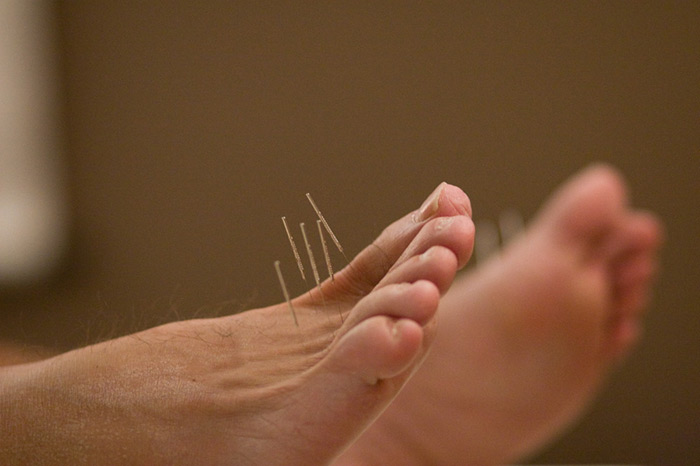Walking, especially on hard or cold surfaces can be very painful, often described as walking on ground glass or stepping on pebbles. When large nerve fibers are involved, patients are more likely to experience sensory loss and weakness in the feet and sometimes hands.

Peripheral neuropathy can affect many different nerves, from sensory nerves that register heat, pain or touch, to motor nerves that control how your muscles move, or autonomic nerves that control blood pressure, heart rate, digestion and bladder function. Specific symptoms vary from person to person, depending on the types of nerves affected. There may be gradual onset of numbness and tingling in the feet or hands which may spread upward into the legs and arms, burning pain, a sharp or electrical pain, extreme sensitivity to touch, lack of coordination, muscle weakness or paralysis if motor nerves are affected, and bowel or bladder problems if autonomic nerves are affected.
Peripheral neuropathy can result from traumatic injuries, infections, vitamin deficiencies, autoimmune diseases, metabolic problems and exposure to toxins. One of the most common causes is diabetes.
Treatment in western medicine depends on the cause. In many cases, peripheral neuropathy symptoms improve with time when the underlying condition that is causing it gets treated. In order to manage the painful symptoms, a number of medications are often used. Unfortunately, these medications are for symptomatic management only and do not affect the disease course and they have various side effects including sedation, leg swelling, paradoxical agitation and weight gain.
According to Traditional Chinese Medicine, pain and dysfunction as a result of peripheral neuropathy are caused by a blockage of qi-energy and blood. If qi-energy and blood don’t flow properly, it prevents cells and tissues from receiving nourishment and can lead to pain and functional problems. In addition, depending on the symptoms experienced, there may be specific meridians that are also affected by the condition. This can affect where the pain and numbness are occurring, and can also be responsible for accompanying symptoms. Acupuncture treatment typically will involve both local points to treat the meridians affected and the symptoms experienced, combined with points for strengthening and building up the body to augment qi-energy and blood.
Mayo Clinic says “Some people with peripheral neuropathy try complementary treatments like acupuncture for relief. Although researchers haven’t studied these techniques as thoroughly as they have most medications, Acupuncture has shown some promise and might reduce peripheral neuropathy symptoms. You might need multiple sessions before you notice improvement. Acupuncture is generally considered safe when performed by a certified practitioner using sterile needles.”
Neurology Wellness Clinic at OHSU also discusses the evidence for acupuncture in the treatment of peripheral neuropathy. “We systematically reviewed 46 clinical trials and included 13 qualifying randomized controlled trials of acupuncture against sham acupuncture or standard medical therapy and concluded that acupuncture is effective in the treatment of diabetic neuropathy, Bell’s palsy, Carpal Tunnel Syndrome and it is most likely effective for the treatment of HIV-related neuropathy.
In the Neurology Wellness Clinic at OHSU we routinely treat patients with peripheral neuropathy and some of our best results are with idiopathic neuropathy (meaning of unknown cause). A typical treatment course consists of weekly sessions with electroacupuncture for 6-8, sometimes 10 weeks, followed by gradual spacing out to every other week, every third week, once a month and eventually maintenance treatment once every 2-3 months.”
In this way, acupuncture can help to relieve many of the symptoms experienced, as well as help to strengthen the body and improve health to improve the functioning of the nerves and the body as a whole. Acupuncture shows promising results for those suffering from peripheral neuropathy. Studies have demonstrated that acupuncture may help to improve nerve conduction, and the World Health Organization recognizes acupuncture as a useful therapy for neurological symptoms like peripheral neuropathy. An individual may not recover immediately or completely through acupuncture, but treatment can make a difference in the symptoms experienced and one’s comfort level. With time, treatments may have a lasting positive impact on peripheral neuropathy and quality of life.